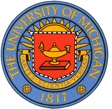David Murray Cowie Professor of Pediatrics and Infectious Diseases and Chairman of the Department of Pediatrics at the University of Michigan Medical School, died on January 27, 1940, of coronary thrombosis. Dr. Cowie was born in Moncton, New Brunswick, Canada, on November 19, 1872, and received his early education there. In 1889 he entered Battle Creek College where he studied for three years before enrolling in the University of Michigan Medical School, from which he graduated in 1896. He was appointed First Assistant to the Professor of Theory and Practice of Medicine, Dr. George Dock, immediately after graduation, thus beginning a long and distinguished career in teaching, research and the practice of medicine. In 1906 he was made Instructor in Pediatrics and in 1907, Clinical Professor of Pediatrics and Internal Medicine. The following year was spent with Professor Krehl in Heidelberg. Upon his return to Michigan he resumed his duties in the Medical School and in his private practice, and in 1920 was made Professor of Pediatrics and Infectious Diseases and head of the newly authorized Department. He held this position until his death.
Dr. Cowie served on the Council of the American Pediatric Society from 1913 to 1920, and was elected President of the Society in 1923. He was a Fellow of the American College of Physicians, the American Academy of Pediatrics, and the American Association for the Advancement of Science. He was President of the Michigan Allergy Society in 1937-38, Chairman of the iodized salt committee of the Michigan State Medical Society since 1922, Secretary of the University of Michigan Pediatric and Infectious Disease Society since 1933, and Vice-President, in 1920-21, of the American Society for the Advancement of Clinical Investigation. He was a member of the American Heart Association, International League against Epilepsy, Michigan Academy of Science, the Nova Scotia Historical Society and the Michigan Historical Society. His bibliography of over one hundred papers reveals a wide diversity of clinical and scientific interests
“David Murray Cowie” as Scotch as “MacGregor”; and what more could one ask in a name! It speaks for itself, character-ability and dogged perseverance, qualities which Cowie possessed in large measure. My first remembered contact with him was in June, 1897. Cowie and I were intimate "Comrades in arms" for a period of six years. During this busy period, I learned to love him, respect him and admire him. Of a certainty - Cowie was a genius-if what Carlyle wrote be true, that "genius is the capacity for taking infinite pains." Cowie possessed · a most lovable, kindly nature and was as free from the taint of envy and jealousy as any doctor in my acquaintance. Medicine is such a personal and individualistic profession, that when one rises above these human frailties, we instinctively exclaim-"Behold the Man." Devotion to duty and his profession was his second nature. No sacrifice was too great when a sick patient - great or lowly-needed his skillful and devoted care. Cowie far outstripped the vast majority of the contemporaries who started out so much better equipped, financially and physically; but evidently not mentally or spiritually. Few men would have been able to carry on such an exacting general and specialized practice as his, organize and develop a brand new department and continue as its chief till his untimely passing; and in addition, initiate and stimulate many valuable researches.
The life of David Murray Cowie is worthy of being set up as an example to medical students of all ages. When he entered the Department of Medicine and Surgery of the University of Michigan he had a frail physique and had given various hostages to fortune. A temperate life compensated for the former; indomitable courage the latter. Also, he had a good ancestral background, a capacity for successful work, and a happy family life.
In his clinical years he spent much extra time doing work now done in the intern year, adding to his knowledge and skill , and so on graduation he was appointed First Assistant in Medicine. That position he held for ten years, with great benefit to patients, undergraduate medical students, colleagues in all departments, and not least to the writer, for Dr. Cowie's long and active association with the clinic of internal medicine was an important source of what success the clinic attained. From the beginning, he did each day the day's work, in wards, laboratories and classrooms, and never failed to keep up the arduous reading required by his many activities. He had charge of the clinical laboratory, which drew upon a rich material in diseases of the stomach, anemias, metabolic and endocrine disorders, as well as diseases of everyday life. His skill and enthusiasm quickly drew to him a volunteer staff of senior students. He had already planned a number of research problems, the details of which were never out of his mind. This resulted in contributions to medical periodicals and in the transactions of special societies, with favorable effects upon his own reputation and that of the School.
When Dr. Cowie joined the staff, diseases of children belonged in internal medicine. We prepared for a change by putting all children with medical diseases under Dr. Cowie's care. Problems of infant feeding from the large obstetric service were placed in his care, and as a natural sequence many others, going on to later years. By 1906 his reputation as a pediatrician was so well established that he was named Instructor in Pediatrics, and by 1907 Clinical Professor in the same branch. In 1908 my official relations with Dr. Cowie ceased, much to my regret, but our friendship continued, with frequent letters up to within a few weeks of his untimely end.
Faculty Senate Memorial



